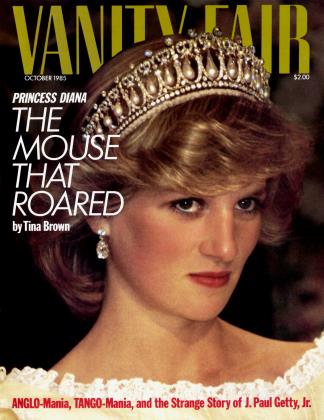Sign In to Your Account
Subscribers have complete access to the archive.
Sign In Not a Subscriber?Join NowEDITOR'S LETTER
TRANSATLANTICA
This issue of Vanity Fair celebrates the invasion of English taste taking place in Washington next month, when the Prince and Princess of Wales arrive to celebrate the resplendent "Treasure Houses of Britain'' exhibition at the National Gallery. Believe me, no one resisted the idea more than I.
From 1979 to 1983 I was the editor of Britain's social magazine the Tatler. By the time I left, I had OD'd on debs and duchesses and their overstuffed houses. In fact, I'd OD'd on England in general, and I couldn't wait to flee "this septic isle." I dreamed of huge white lofts in Manhattan sparsely populated with graffiti art and trapezoid fifties furniture. O my America! My new-found-land! I yearned for a brave new world.
But it was not to be. The English-taste invasion had already beaten me to it. Every time I go out to dinner I find myself aggressed by chintz. All the big white lofts have turned into mock-ups of the Duke of Beaufort's drawing room with library veneers and designer dog hairs. Fly-fishing manuals replace the art-photography books—along with back numbers of Private Eye magazine and novels by tasteful English spinsters like Anita Brookner and Barbara Pym. When Architectural Digest, the bible of high glitz and peach mirror, came out with a country-house special in June, I knew the battle was over. English taste was here to stay.
I have to admit it was fun going home to England as an American tourist. Staying at the Ritz I felt hilariously rich, and as I raced down Bond Street with an overheated credit card I began to understand what Americans see in the Old Country.
In fact, once you've lived on both sides of the Atlantic, it's impossible to be content with either. One becomes haunted with the perfect place called Transatlantica, which is somewhere in between. Its population shares England's civility and America's energy, England's irony and America's optimism, England's coziness and America's breadth, England's sense of the past and America's belief in the future. Whichever side you settle, your sensibilities are forevermore on the frequent flier's program.
My mission in London was to catch up on what has happened to the Princess of Wales since her marriage: the results of my research are on page 58. I arrived, appropriately enough, on the eve of the royal-wedding anniversary. Four years before, I had been sitting on NBC's platform in the trees outside Buckingham Palace alongside Tom Brokaw and Jane Pauley on the Today show's "Royal Wedding Special." Brokaw, as I recall, was not a natural royalist. "Let's talk about the size of Lady Diana's feet," he said during one commercial break. "I mean, she's got gunboats down there." But even Brokaw fell silent when the royal coach glittered past on the sun-blurred monitor. It was a moment of pure romance.
If the princess, as joint patron of the exhibition, is the keynote of the issue, Auberon Waugh's piece about what it's really like to live in an English country house, on page 66, is the grace note. One of the pleasures of commissioning this month was the excuse it gave to let you hear his uniquely English voice in Vanity Fair. Waugh, the son of Evelyn, is the most entertaining crab in England. His diary in Private Eye and his column in The Spectator are required reading in Britain. We have been friends since I was nineteen, when, as an Oxford undergraduate, I went to interview him on my first journalistic assignment in a series called "Oxford Supermen" for the university magazine Isis. After the list of sportsmen, captains of industry, and other overachievers that preceded him, the Young Fogey Waugh was considered an odd choice, but I had just read his wildly funny excoriation in The Spectator of a pretentious novel by John Berger and longed to shake the hand of the assassin. Like everyone who knows and loves Bron, as he prefers to be known, I was surprised to find the lethal squire of Combe Florey House so gentle and reserved in person. Only a light, churchmanlike giggle gives away the seething anarchy beneath. We became pen-friends and corresponded indiscreetly for ten years. It is pleasing to know that this summer his eighteen-year-old daughter, Daisy Waugh, started work on the copydesk of the Tatler.
In fact, putting this October issue together made me spend a lot of time in Transatlantica. To amend Robert Browning: "Oh, to be in England now that England's here."
Editor in chief
 View Full Issue
View Full Issue












Subscribers have complete access to the archive.
Sign In Not a Subscriber?Join Now